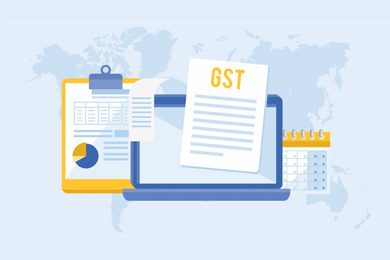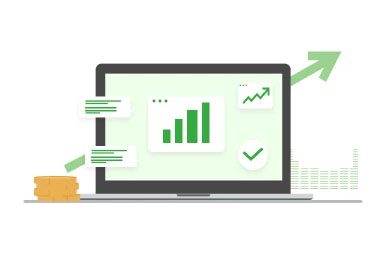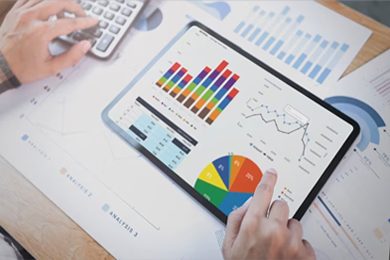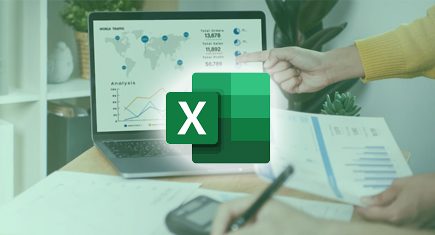



 Tech & IT
Tech & IT
 Business
Business
 Coding & Developer
Coding & Developer
 Finance & Accounting
Finance & Accounting
 Academics
Academics
 Office Applications
Office Applications
 Art & Design
Art & Design
 Marketing
Marketing
 Health & Wellness
Health & Wellness
 Sounds & Music
Sounds & Music
 Lifestyle
Lifestyle
 Photography
Photography
More Learnfly
Business Solution Become an InstructorFinancial modeling is the creation of mathematical representations (models) of financial scenarios. It involves using data and assumptions to build dynamic models for forecasting, budgeting, and decision-making, aiding businesses in evaluating potential outcomes and making informed financial strategies.
.jpg)
By : Piyush Arora, CFA, CAIA
The Ultimate Financial Modelling Course!...
4.8 834
1:54:33 hrs 16 lectures All Level
.jpg)
By : Kiran Beldar
Learn Financial Modeling and Sensitivity Analysis of 25 MW Solar Power Plant when el...
4.8 935
1:9:32 hrs 8 lectures All Level
.jpg)
By : Kiran Beldar
Learn Financial Modeling of 5 MW Solar Power Plant under OPEX Model (Open Access) (I...
4.8 1117
1:17:0 hrs 8 lectures All Level
.jpg)
By : Kiran Beldar
Learn Financial Modeling and Sensitivity Analysis of 1 MW Solar Captive Power Plant...
4.1 1099
1:24:42 hrs 8 lectures All Level
.png)
By : CA Kuldeep Sharma
Learn how to prepare DCF models right from the scratch...
4.5 866
2:6:35 hrs 16 lectures Intermedite Level

By : Victor Ogundele
Financial modeling is a practical concept that is applied to day-to-day business oper...
4 1319
4:22:2 hrs 81 lectures All Level

By : Daniel Alexandru Petrescu
The "planning" in Financial Planning and Analysis (FP&A) means more than only budgeti...
4.3 844
1:0:20 hrs 9 lectures Intermedite Level

By : Daniel Alexandru Petrescu
A bit on assets side, a bit on liabilities side...
4.9 91867
1:20:20 hrs 10 lectures Intermedite Level

By : Dobromir Dikov FCCA, FMVA
Learn how to build professional 3-statement budget models in Excel...
4.7 92801
5:28:2 hrs 55 lectures Intermedite Level

By : Atif Noor
Learn to carry out advanced financial modeling and analysis using top techniques in E...
4.5 84390
2:34:59 hrs 12 lectures All Level












Learn more topics in various categories at one place. Explore unlimited courses in other categories and up-skill yourself today.

 Jazeb Akram
Jazeb Akram 4.2 771158 Beginner Level

 John Hedengren
John Hedengren 4.1 569061 All Level

 Ranjan Pandey
Ranjan Pandey 4.1 346728 All Level

 Muhammad Ahsan Pervaiz
Muhammad Ahsan Pervaiz 4.2 101336 All Level

 Pieter Vliegenthart
Pieter Vliegenthart 4.6 100916 All Level

 Jerome P.
Jerome P. 4.8 100880 All Level

 Senol Atac
Senol Atac 4.9 100091 All Level

 Vikas Munjal
Vikas Munjal 4.8 100064 Beginner Level

 Avinash A
Avinash A 4.8 100013 All Level

 Biz Facility
Biz Facility 6 Lectures All Level

 Biz Facility
Biz Facility 6 Lectures All Level

 Biz Facility
Biz Facility 5 Lectures All Level

 Biz Facility
Biz Facility 4 Lectures All Level

 Biz Facility
Biz Facility 4 Lectures All Level

 Biz Facility
Biz Facility 6 Lectures All Level
.jpg)
 Prabh Kirpa Classes
Prabh Kirpa Classes8 Lectures All Level

 AWESOME EMMANUEL
AWESOME EMMANUEL57 Lectures All Level

 AWESOME EMMANUEL
AWESOME EMMANUEL42 Lectures All Level
.jpg)
 Piyush Arora, CFA, CAIA
Piyush Arora, CFA, CAIA16 Lectures All Level

 LEMMY FRANCISCO KAWONGA
LEMMY FRANCISCO KAWONGA 46 Lectures All Level

 LEMMY FRANCISCO KAWONGA
LEMMY FRANCISCO KAWONGA 16 Lectures All Level
.png)
 CA Kuldeep Sharma
CA Kuldeep Sharma32 Lectures All Level
.jpg)
 Kiran Beldar
Kiran Beldar8 Lectures All Level
.jpg)
 Kiran Beldar
Kiran Beldar8 Lectures All Level
.jpg)
 Kiran Beldar
Kiran Beldar8 Lectures All Level
.jpg)
 SONU THOMAS
SONU THOMAS26 Lectures All Level
.jpg)
 SONU THOMAS
SONU THOMAS10 Lectures All Level
.png)
 CA Kuldeep Sharma
CA Kuldeep Sharma16 Lectures All Level
.jpg)
 Zenith Academics
Zenith Academics55 Lectures All Level

 Zenith Academics
Zenith Academics18 Lectures All Level

 Zenith Academics
Zenith Academics39 Lectures All Level

 Veer Tutorial
Veer Tutorial71 Lectures All Level

 Graziano Giuseppe Di Capua
Graziano Giuseppe Di Capua27 Lectures All Level

 Victor Ogundele
Victor Ogundele81 Lectures All Level

 Biz Facility
Biz Facility 5 Lectures All Level
 (4).jpg)
 Biswaroop Sen Sen
Biswaroop Sen Sen27 Lectures All Level

 Steve Liguori
Steve Liguori19 Lectures All Level
.jpg)
 Greg Henriques
Greg Henriques15 Lectures All Level
.jpg)
 Shalom Martin
Shalom Martin19 Lectures All Level
.jpg)
 Shalom Martin
Shalom Martin11 Lectures All Level

 Urs Ravi I Vedanta Educational Academy
Urs Ravi I Vedanta Educational Academy275 Lectures All Level

 Daniel Alexandru Petrescu
Daniel Alexandru Petrescu8 Lectures All Level

 Daniel Alexandru Petrescu
Daniel Alexandru Petrescu8 Lectures All Level

 David Johnson
David Johnson20 Lectures All Level

 Daniel Alexandru Petrescu
Daniel Alexandru Petrescu8 Lectures All Level

 Daniel Alexandru Petrescu
Daniel Alexandru Petrescu9 Lectures All Level

 Daniel Alexandru Petrescu
Daniel Alexandru Petrescu8 Lectures All Level

 Daniel Alexandru Petrescu
Daniel Alexandru Petrescu10 Lectures All Level

 Daniel Alexandru Petrescu
Daniel Alexandru Petrescu12 Lectures All Level

 Daniel Alexandru Petrescu
Daniel Alexandru Petrescu9 Lectures All Level
 (1).jpg)
 Daniel Alexandru Petrescu
Daniel Alexandru Petrescu9 Lectures All Level

 Daksh Murkute
Daksh Murkute19 Lectures All Level

 Dobromir Dikov FCCA, FMVA
Dobromir Dikov FCCA, FMVA55 Lectures All Level

 Chester Sky
Chester Sky14 Lectures All Level

 Humberto Malaspina
Humberto Malaspina47 Lectures All Level

 Accounting is a piece of cake VRN
Accounting is a piece of cake VRN9 Lectures All Level

 Steve Liguori
Steve Liguori10 Lectures All Level

 Steve Liguori
Steve Liguori14 Lectures All Level

 Tawanda Irvine Makoni
Tawanda Irvine Makoni10 Lectures All Level

 Tawanda Irvine Makoni
Tawanda Irvine Makoni18 Lectures All Level

 Atif Noor
Atif Noor12 Lectures All Level

 Anurag Singal
Anurag Singal17 Lectures All Level

 Ross Maynard
Ross Maynard12 Lectures All Level

 Anurag Singal
Anurag Singal23 Lectures All Level

 Blair Cook
Blair Cook10 Lectures All Level

 Blair Cook
Blair Cook5 Lectures All Level

 Blair Cook
Blair Cook5 Lectures All Level

 Blair Cook
Blair Cook7 Lectures All Level

 Blair Cook
Blair Cook7 Lectures All Level

 Blair Cook
Blair Cook8 Lectures All Level

 Blair Cook
Blair Cook28 Lectures All Level

 Blair Cook
Blair Cook8 Lectures All Level

 Blair Cook
Blair Cook7 Lectures All Level

 CA N Raja Natarajan
CA N Raja Natarajan25 Lectures All Level

 Manish Gupta
Manish Gupta34 Lectures All Level

 Quantic Statistics R spatial analysis
Quantic Statistics R spatial analysis13 Lectures All Level

 Ashwini Bissa
Ashwini Bissa14 Lectures All Level
Financial modeling is the process of creating a mathematical representation (model) of a company's financial situation. It involves using historical data and assumptions to forecast future financial performance, often presented in spreadsheet software.
Financial modeling is essential for decision-making, valuation, and strategic planning. It helps businesses and investors analyze potential scenarios, make informed projections, and assess the impact of various financial decisions on the organization's performance.
Key components include income statements, balance sheets, cash flow statements, and supporting schedules. Forecasting revenue, expenses, and other financial metrics, as well as incorporating sensitivity analysis and scenario planning, are integral parts of the modeling process.
Technology plays a significant role in financial modeling through the use of specialized software such as Microsoft Excel, financial modeling tools, and data analytics platforms. These technologies enhance efficiency, accuracy, and the ability to handle complex financial scenarios.
Important skills include a strong understanding of finance and accounting principles, proficiency in spreadsheet software, attention to detail, analytical thinking, and the ability to translate business operations into mathematical models. Effective communication of model results is also crucial.





